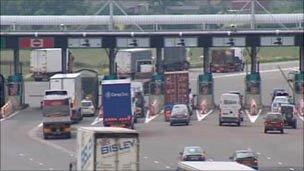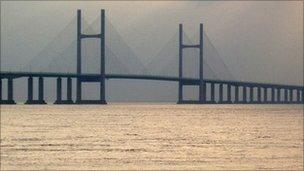MPs learn Severn Crossing tolls should fall in 2017
- Published

Severn tolls should fall, MPs establish
Severn Crossing tolls should be much cheaper once the concession to run them ends in 2017, a committee of MPs has established.
The Welsh Affairs Committee heard most of the £77m the tolls raise annually is used to cover debts.
Severn Crossing Plc General Manager Jim Clune said only maintenance and running costs would need to be covered after 2017.
MP Geraint Davies said tolls should fall to 20 to 30% of current levels.
Crossings currently cost £5.50 for cars and up to £16.40 for HGVs.
Mr Clune told MPs the tolls cost £15m a year to run and maintain, but generate a net revenue of £77m a year at today's prices.
Swansea West MP Geraint Davies put it to Mr Clune that much of that income is used to service debt which would be repaid when the operator's concession ends in 2017.
He added that there was therefore no reason why tolls shouldn't decrease to 20-30% of current prices (or their inflation adjusted 'real terms' 2017 equivalent) once the UK government takes over running the tolls.
Mr Davies said: "I think what you're implying in your figures is that we could charge something in the order of 20-30% of the current charge and cover all our mundane costs, which might have a massive stimulus for the Welsh economy."
Raise revenue
Mr Clune replied: "Certainly, once the ongoing debt is cleared, then you're just looking at the ongoing maintenance costs."
Also appearing before the committee, Deputy First Minister Ieuan Wyn Jones declined to be drawn on whether he thought tolls should decrease significantly after 2017.
Plaid Cymru committee member Jonathan Edwards MP said he would like to see control over the crossings rest with the assembly government after the current contract runs out in 2017.
Mr Edwards said: "Control of the bridges could allow the Welsh government to set tolls at a level enabling them to raise revenue to reinvest in the wider Welsh transport infrastructure."
The committee heard that when Severn Crossing Plc entered into the concession, they had spent £510m (at 1990 prices) between serving a debt on the existing crossing and building a new one.
The expectation was that they would raise £1bn in revenue (in 1989 prices).
But Mr Clune said it was not yet possible to say whether running the tolls would make an overall profit.

Severn Bridge Plc say its not yet possible to say if the tolls will make an overall profit.
He said the costs of outstanding debts continued to accrue at a time when traffic volumes had been badly affected by the recession.
Heavy goods traffic was down year on year by as much as 15%, to levels which have not been so low since 1998.
Mr Clune said: "The way the project finance agreements are written, the company and the shareholder investors in the company are not entitled to take any profit until the end of the concession.
"So it is literally a twenty-five or twenty-six year investment period. And at this point in time, if we have done our sums correctly with regard to the construction cost and the maintenance cost then there may be a profit.
"We're still seven years away from that and we cannot say at the moment what that profit would be."
He also said a temporary method of taking credit card payments at the crossings would be reintroduced in a few days, with a permanent method in place in the first quarter of 2011.
- Published20 October 2010
- Published16 September 2010